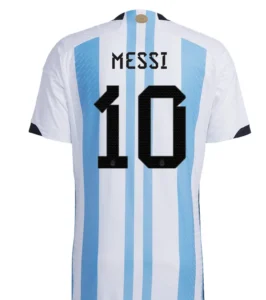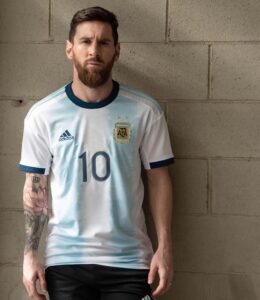Messi shirt ban sparks global debate. Argentina’s coach, Lionel Scaloni, remains confident that Lionel Messi jerseys will be seen in the home section during Thursday’s South American World Cup qualifier against Paraguay, despite the Paraguayan Football Association (APF) banning rival shirts for the match. The game will take place at the Defensores del Chaco stadium in Asuncion, where the APF’s manager, Fernando Villasboa, has warned fans to wear only Paraguayan shirts, emphasizing that no Argentina or foreign club jerseys will be allowed. He clarified that the restriction was not aimed at Messi personally but was an effort to maintain the integrity of the home crowd.

Paraguay’s coach, Gustavo Alfaro, distanced himself from the controversy, stating that he was unaware of the shirt ban, which he believes is intended to minimize any potential conflicts. Despite this, Scaloni believes that Messi’s global influence is undeniable and will see Argentina’s iconic No. 10 shirt present in the stadium. He emphasized that wearing a Messi jersey does not signify disloyalty to Paraguay but rather a recognition of Messi’s extraordinary achievements in football. Scaloni also acknowledged that the passion for Messi transcends national boundaries, reinforcing the admiration that football fans hold for the player.
As of now, Argentina leads the South American World Cup qualifying standings with 22 points, three points ahead of Colombia, and will face Peru on November 19 after the Paraguay match.
The latest controversy surrounding Lionel Messi has stirred significant debate, this time in the heart of South America, where Argentina is set to play Paraguay in the 2026 World Cup qualifiers. Paraguay’s Football Association (APF) has made a bold move by banning the wearing of Argentina’s jerseys, including those with Messi’s name, in the home section at the Defensores del Chaco Stadium. This has not only raised eyebrows but also sparked a broader conversation about football rivalry, national pride, and the global reach of players like Messi.

APF manager Fernando Villasboa stated that the ban was not aimed specifically at Messi, but rather as a way to preserve the sanctity of the home ground. “We won’t allow the other team’s shirt,” he said, stressing that this measure was about protecting the pride of Paraguay’s home fans. “It’s not a problem against Messi. We respect the careers of all footballers. It’s just that the home ground is very important to us.” His comments underline the fierce competition between the two nations, whose footballing history has been rich with rivalry.
In contrast, Argentina’s coach Lionel Scaloni expressed confidence that Messi’s influence would transcend any ban, and that Argentina jerseys would still make their way into the stands. “Logically, for the Paraguayan footballer, for the fan, they all want to wear the national team shirt. But Leo [Messi] is stronger than all that and there will be Argentina shirts,” said Scaloni. He argued that wearing a Messi jersey does not equate to disloyalty to Paraguay, but rather reflects the global admiration for the iconic forward, who has won multiple Ballon d’Ors and led Argentina to World Cup glory.
The Messi shirt ban highlights a deeper issue in South American football, where the passion for the sport often spills over into nationalistic fervor. Messi, now 39, is regarded not just as Argentina’s greatest player but as one of the best in the world, a player whose achievements transcend borders. His status has made him a universally recognized figure, earning adulation from fans worldwide, including in countries like Paraguay, where his legendary status is unchallenged. It also brings into focus how footballing loyalty is increasingly being tested in an era where global recognition of players can sometimes overshadow national rivalries.
Conclusion: The Messi shirt ban controversy is a stark reminder of how football is no longer just a game confined to national borders. Messi’s global fame and unprecedented career achievements have made him a figure admired far beyond Argentina, leading to complex dynamics in international fixtures. While Paraguay’s ban reflects a desire to protect local pride, it also underlines the power of individual players in shaping the global footballing landscape. For fans in Paraguay, as Scaloni pointed out, wearing Messi’s shirt is not a betrayal of their country, but a recognition of a legend. Whether the ban will impact the match atmosphere or fuel further debates in the future remains to be seen.
